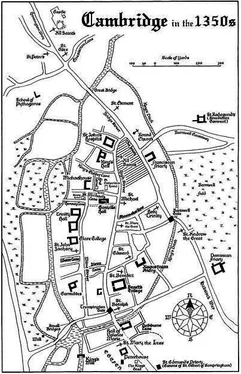‘You are not fat,’ said Bartholomew gallantly. ‘But there are dietary regimes that promote good health as well as a thinner figure. If you like, I can draw up–’
‘Matt!’ said Edith sharply. ‘This is not the time.’
‘I would have helped,’ said Abigny, regarding his sister with gentle affection. ‘I admit I have not amounted to much, with my token post at the law courts and my squandered fortune, but I would have looked after you.’
She gazed at him bleakly. ‘You will wed this year. Do you think your salary can support me and your new wife? Will Janyne want her husband’s sister living in her house? And you have missed my point: I do not want to struggle along on pennies. I would have married Matt if I had been content with that.’
Her face was haunted, and Abigny leaned across to take her hand in his. ‘Your finances and your dreams are your business, Philippa. You do not have to share them with others.’
‘It is better they know the truth,’ she said tiredly, indicating Bartholomew and his family. ‘I do not want them speculating, and coming up with answers that show me in a poorer light than even I deserve.’ She took a deep breath and turned to Edith, apparently finding it easier to address her than the others. ‘I did not know what to do with myself when I first heard the news about Walter. I could not imagine what would become of me – and Giles – just because Walter had elected to go skating.’
‘You said he would never have done that,’ prompted Bartholomew, when she fell silent.
‘I still think he would not. He was too cautious to have ventured out on to weak ice. I suppose I shall never know why he did it. But then, when I heard he was still alive, I felt a sudden relief, as though I had been reprieved. He opened his eyes and looked at me, and I am sure he read the fear and apprehension for my future in my face. He said two words: “Temple” and “you”.’
‘Temple?’ asked Edith, curiously. ‘What does that mean?’
‘It is the name of our home,’ said Philippa. ‘Temple House – because it has arches on the front like the Temple Church in Fleet. Those words told me that the house was mine, that he had made provision for me in his will. I am not penniless after all.’
Bartholomew gazed at her. So that was the reason for the change in her behaviour between when she first learned about Turke’s accident and his death. She had gone from being a penniless widow with no future to the owner of a large and substantial home. He recalled their discussion at the Christmas feast, when she had mentioned the splendid house that bore resemblance to the Temple Church with its columns and round-headed windows.
‘So that explains all this odd behaviour?’ asked Stanmore, relieved. ‘You were trying to maintain a grief that you do not genuinely feel?’
Philippa looked pained. ‘Now you think me a hypocrite. I loved Walter in my own way, and I will miss him. And I shall respect his memory and do all a good widow should do. But I am not devastated by his death. However, I shall need to act my part until we have buried him and allowed his Fraternity friends to say their farewells.’
‘You should have told us,’ said Edith, sounding hurt. ‘We can be trusted not to tell people that you are looking forward to a brighter future now Walter is gone.’
‘You said you did not understand the meaning of Walter’s final words,’ said Bartholomew, trying not to sound accusing. ‘But you did.’
Philippa gave a wry smile. ‘Do you think I should have told you I had just received the happy news that I am the owner of the best house on Friday Street while my husband’s corpse was still warm? That would not have been appropriate!’
‘Neither was changing from debilitating grief to cool efficiency in a matter of moments,’ muttered Bartholomew. He spoke aloud, wishing she had chosen to be honest sooner. It would have saved a good deal of agitation for Stanmore. ‘So, Walter did not mention Dympna, and my theories associating him with Norbert are wrong?’
‘The only time I have ever heard that name was when Mayor Horwood mentioned it at the feast,’ replied Philippa. ‘He thought Dick Tulyet might be its leader.’
‘Dick?’ mused Bartholomew thoughtfully. Was that the link between Dympna and Norbert – that the beneficiary of one loan was Tulyet’s cousin? But Tulyet would not have asked Michael to investigate if he had been responsible for Norbert’s death, surely? ‘Did Horwood say anything more about this guild?’
‘Not that I recall,’ replied Philippa. She shivered and edged closer to the fire. ‘I had forgotten how cold it can be in this little town. I am not surprised Gosslinge succumbed to the weather.’
‘When I was re-examining Gosslinge, I found something trapped in his throat,’ said Bartholomew, watching as Edith fussed around Philippa with a woollen blanket. ‘I think he choked, rather than died of the cold. Was he in the habit of putting things in his mouth?’
‘Yes,’ said Abigny immediately, nodding in surprise. ‘His mouth was never empty, now that you mention it. There was always something poking out – a blade of grass or a sliver of wood for picking his teeth. He had restless jaws that always liked to be working on something.’
‘He sounds like Brother Michael,’ said Edith with a giggle. She prodded Abigny with her foot and indicated he was to roll the dice again. The conversation was at an end. Philippa huddled closer to the fire, and continued to stare into the flames, while Stanmore went to fetch more wood. Bartholomew watched her while he sipped his wine, thinking that for someone who had just been relieved of a tiresome husband and presented with a fine house, she still seemed preoccupied. He was certain there was something she had still not told them, and recalled Matilde’s words – that there was something sad about Philippa. He wondered what it could be, and why she had not unburdened herself of that secret, too.
It was too late, too cold and too dark for Bartholomew to return to Michaelhouse once the evening was over – the traditional games of cross and pile, raffle, hasard and queek had been played, the seasonal food eaten and the spiced wine drunk – so he accepted a bed in Stanmore’s attic. Once again, his dreams teemed with confused images and conversations, most of them featuring Philippa. He lay, half awake and half asleep, watching patterns made by the firelight move across the ceiling, and tried to make sense of the information he had gathered.
For the first time in several days, no snow fell during the night. A thick blanket of cloud served to insulate the Earth from the frigid night sky, and the temperature crept up until it was actually above freezing point. Compared to the conditions of the past several days, the little town was positively balmy, and Bartholomew felt overdressed and hot as he donned his various layers of tunics and jerkins the following morning. The warmer air weakened the icy hold of winter, and everything dripped. For the second day in a row, the streets were full of hissing, sloughing and cracking sounds as melting snow parted company with roofs, trees, walls and eaves. The ground no longer comprised hard-packed ice, but a lumpy brown slush that was knee deep in places.
Bartholomew left Stanmore’s house before dawn, and prepared to wade through the thaw to St Michael’s Church. He thought he was the only one awake, and was surprised to discover Philippa waiting for him, dressed in her black clothes. She wanted someone to walk with her when she went to say morning prayers for her husband’s soul. She leaned heavily on Bartholomew’s arm, her hood shielding her face in the manner expected of a woman who had been recently widowed. He noticed her shoes were thin and dainty and did little to protect her feet from the icy muck of the High Street. The Philippa of his memories had been a practical woman, who would have worn boots. He wondered whether this Philippa had donned shoes because they looked better with her elegant fur cloak, or whether her mind was absorbed by other matters.
Читать дальше












